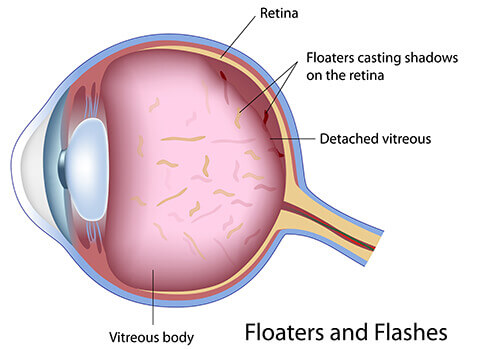Flashes & Floaters
What are floaters?

You may sometimes see small specks or clouds moving in your field of vision. These are called floaters. You can often see them when looking at a plain background, like a blank wall or blue sky. Floaters are actually tiny clumps of gel or cells inside the vitreous, the clear gel-like fluid that fills the inside of your eye.
While these objects look like they are in front of your eye, they are actually floating inside it. What you see are the shadows they cast on the retina, the layer of cells lining the back of the eye that senses light and allows you to see.
Floaters can appear as different shapes such as little dots, circles, lines, clouds, or cobwebs.
What causes floaters?
When people reach middle age, the vitreous gel may start to thicken or shrink, forming clumps or strands inside the eye. The vitreous gel pulls away from the back wall of the eye, causing a posterior vitreous detachment. This is a common cause of floaters.

Posterior vitreous detachment is more common in people who:
- are nearsighted
- have undergone cataract operations or injury to the eye
- have had YAG laser surgery of the eye
- have had inflammation inside the eye
- The appearance of floaters may be alarming, especially if they develop very suddenly. Contact us right away if you develop new floaters, especially if you are over 45 years of age.
Are floaters ever serious?
The retina can tear if the shrinking vitreous gel pulls away from the wall of the eye. This sometimes causes a small amount of bleeding in the eye that may appear as new floaters.
A torn retina is always a serious problem, since it can lead to a retinal detachment. You should see your ophthalmologist as soon as possible, especially if you are over 45 years of age, have had an injury to your eyes or head, or if you have substantial nearsightedness. Symptom of a torn retina include:
- A shower of new floaters
- A sudden appearance of flashes
- Having a shadow or curtain appear in the periphery (side) of your field of vision
- Seeing a gray curtain moving across your field of vision
- Having a sudden decrease in your vision
How are your eyes examined?
When your CNY Eye ophthalmologist examines your eyes, your pupils may be dilated with eye drops. During this examination, your doctor will carefully observe areas of your eye, including the retina and vitreous. If your eyes have been dilated, you will need to make arrangements for someone to drive you home afterward.
Floaters and flashes become more common as we grow older. While not all floaters and flashes are serious, you should always have a medical eye examination by an ophthalmologist to make sure there has been no damage to your retina.
